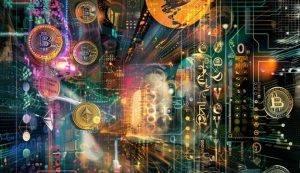The Power Of NFT: Will NFT Ever Rule The World?
The hype concerning NFTs is because it is considered the next big thing in blockchain technology, and investors and cybercriminals are attracted to the digital treasure cave. With the creation of NFTs, power is given back to digital creators, and it has become an effective income source for artists looking to make it big.
For NFT enthusiasts who are not artists but just industry lovers, NFTs have provided a way to connect to their preferred digital artist while making potential future investments. Considering the numerous financial benefits of NFT, many people are driven to learn how to buy NFT.
But then, why people buy NFTs is not what is being discussed. Let’s dig in and talk about what NFTs are and the promising use cases they will provide in the future.
Why The Hype About NFTs?
It is almost impossible for the average internet user to scroll around the internet and media without coming across discussions on non-fungible tokens. Enthusiasts and investors hold many discussions about NFTs on different media platforms, Twitter and Discord inclusive. Beyond the hype that NFTs are currently receiving from media and news outlets, is there any real potential for the technology in the future?
Some people think NFTs are just a passing fad and enjoying the temporary hype. NFT critics find no reason why someone should pay millions of dollars to buy a digital picture you can download to your device free of charge.
Does this mean that the investors investing a lot of money into this technology will lose out in the end? Is this just a dead-on-arrival technology that will fade off once the hype dies down? Maybe, beyond the current rave about NFTs, there are applications of the technology in the real world. Do these unique use cases present an opportunity for NFTs to rule the world?
What Are NFTs?
Some NFT devotees don’t know in-depth what they are and how they operate. But in reality, one must know what this technology is, how it came to be, and how NFTs work.
NFTs are made up of two words that represent the complete picture of what NFTs stand for when brought together. There are economic commodities or assets whose replacement can be easily done with an identical asset, while others are not interchangeable. Financial items which are easily interchanged or replaced are “fungible,” while those that are irreplaceable by an equivalent commodity are “Non-fungible.”
No matter the permutations or modifications, no NFT is equal or interchangeable with another. You know about NFTs; what about the technology on which NFTs function, and how does it operate on such technology?

How Do NFTs Operate?
Of course, non-fungible tokens are not rocket science; there must be a technology on which they operate. There would be no NFTs without blockchain technology; there is an inseparable relationship between the two.
The relationship between NFTs and blockchain technology is like cars and energy. Without some form of energy, mechanical, solar, and others, a vehicle will not be able to function.
It is upon the blockchain, a digital ledger of transactions, that NFTs are built because it is secured and decentralized. The way information is stored on the blockchain is different from the conventional database, for instance, the database of an e-commerce platform.
A series of data, known as “blocks,” linked together is one of the most straightforward ways to explain how blockchain technology operates. With significant technological advancements, it is now regular for a transaction to be validated using blockchain tokens. With how the blockchain is built, impossibility is the word used to describe the feasibility of a hacker tampering with NFT data within a block.
Another key takeaway from blockchain technology is smart contracts, and it is upon this that NFTs were created. With the creation of NFTs, what is its potential to take over the world, what are its use cases, or is it just here to enjoy a temporary hype?
Potential Applications Of NFTs
Gaming Industry
It is safe to say that NFTs and the gaming industry have a bride-groom relationship; they are a match in heaven. After all, the majority of the people that enjoy playing a game are lovers of art; a game is a form of art.
Because of cross-platform playability, NFT is a way game developers can use to generate another stream of income and increase their reach to different audiences. NFTs act as incentives to gamers and increase the value of NFT items since it is straightforward to trade them in games.

Real Estate
Yes, of course, NFTs have a tremendous relationship and future with the real estate industry for several reasons. One of the inherent properties of NFTs is proof of ownership, and in real estate, there is a constant need to prove that you are the property owner.

Identity Verification
A potential application of NFTs in the future is how they can be used to store and verify an individual’s information. NFT birth certificates are a way humans can be verified; information cannot be tempered or stolen on the blockchain, so an individual’s birth information is kept safe.
Patents
Apart from the monetary benefits, an excellent reason digital creators are enthusiastic about the future of NFTs is how they can be used to protect one’s intellectual property. With the security the blockchain provides, it is possible to protect and prove that you are the intellectual property or invention owner.
Ticketing
NFTs have the potential to replace the conventional method of offering or using a ticket. Access to musical concerts and restricted areas can be granted by using the unique codes that come with NFTs.
Conclusion
As it stands now, many NFT investors and enthusiasts are no longer investing in the industry mainly because of the monetary benefits. The potential future use cases are one of the things that come to the mind of investors before investing.
















